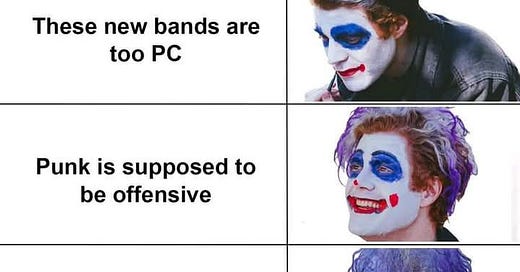The very phrase "conservative punk" represents more than mere contradiction—it embodies a dangerous attempt to neutralize one of modern history's most potent forces for social change. This isn't just about music or fashion; it's about the deliberate corruption of a movement that has served as the last line of defense against creeping authoritarianism for nearly half a century.
Let's dispense with pleasantries and confront the reality: punk emerged from the crucible of social and economic oppression, forged in direct opposition to the conservative ideologies that perpetuated that oppression. When The Clash sang "Career Opportunities," they weren't merely composing catchy rhetoric—they were documenting the systematic destruction of working-class opportunities under conservative governance. When Crass declared "Do They Owe Us A Living? 'Course They Do!" they were directly challenging the conservative notion that poverty is a personal failure rather than a systemic design.
The contemporary conservative movement's attempt to align itself with punk culture is particularly egregious given our current political landscape. Consider the profound hypocrisy: Today's conservatives champion the very power structures that punk was created to dismantle. They worship at the altar of unbridled capitalism while punk has consistently fought for economic justice. They advocate for increased police militarization while Black Flag was writing anthems against police brutality. They defend corporate monopolies while Dead Kennedys were warning us about the dangers of unchecked corporate power.
This ideological contradiction becomes even more stark when we examine the modern conservative movement's standard-bearers. Today's conservative "thought leaders" aren't just defending the system—they're actively working to concentrate more power in fewer hands. They've transformed conservative ideology from its already problematic roots into something far more insidious: a cult of personality centered around billionaire oligarchs who present themselves as maverick outsiders while functioning as the ultimate insiders.
The tech industry's conservative darlings perfectly exemplify this contradiction. They position themselves as disruptors while systematically crushing worker organizations. They claim to champion free speech while controlling vast communications networks that they manipulate for their own benefit. They present themselves as innovators while merely finding new ways to extract wealth from the working class. This isn't disruption—it's rebranding oppression for the digital age.
What makes this co-optation attempt particularly dangerous is its subtle corruption of punk's fundamental principles. The DIY ethic of punk wasn't about entrepreneurial capitalism—it was about creating alternatives to capitalist systems. The individualism of punk wasn't about libertarian property rights—it was about personal autonomy in the face of oppressive social norms. The anti-authoritarian stance of punk wasn't about opposing government regulation of business—it was about fighting against all forms of hierarchical power, including and especially corporate power.
This matters because punk has historically served as more than just a cultural movement—it has been an essential force for social progress. When punk bands screamed "Nazi Punks F--- Off," they weren't engaging in theatrical provocation—they were drawing a necessary line against fascist infiltration of countercultural spaces. When they created independent distribution networks, they weren't just avoiding major labels—they were demonstrating practical alternatives to corporate control.
The conservative attempt to claim punk represents a calculated effort to neutralize its revolutionary potential. By trying to redefine punk as merely an aesthetic or an attitude, they seek to strip it of its fundamental political meaning. This isn't accidental—it's part of a broader conservative strategy to defang and commodify resistance movements.
Here's what actual punk looks like in practice: It's organizing unions in Amazon warehouses. It's creating mutual aid networks while conservatives dismantle social services. It's establishing autonomous spaces while conservatives criminalize protest. It's fighting for environmental justice while conservatives deny climate change. It's standing with marginalized communities while conservatives legislate discrimination.
Conservative "punks" want the credibility of rebellion without the responsibility of resistance. They want to adopt the posture of revolutionaries while defending the status quo. They want to appropriate the language of resistance while serving the forces of oppression. This isn't just philosophically inconsistent—it's actively harmful to punk's essential function as a force for social change.
The conclusion is inescapable: There can be no such thing as "conservative punk." The very concept represents a fundamental misunderstanding—or deliberate misrepresentation—of what punk means. You cannot simultaneously serve the forces of oppression and claim the mantle of resistance against oppression.
The stakes here aren't merely academic. At a time when authoritarianism is on the rise globally, when corporate power reaches unprecedented heights, when the very future of human civilization faces existential threats from climate change and inequality, we cannot afford to let one of our most powerful tools for resistance be co-opted by those who serve the very systems we need to fight.
So let's be absolutely clear: If you're defending billionaires, you're not punk. If you're supporting policies that crush the poor and marginalized, you're not punk. If you're championing corporate power and authoritarian control, you're not punk—you're everything punk exists to resist.
The battle for punk's soul isn't just about music or culture—it's about preserving one of our most effective weapons against oppression. In an era defined by existential threats to human freedom and dignity, we cannot allow this vital force for resistance to be neutralized by those who serve the very systems it was created to fight.
The truth remains as relevant today as it was when punk first emerged from the streets: You cannot serve both the system and the resistance. Choose your side.





